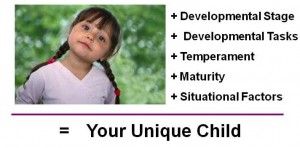 Children grow at different rates in many different areas. When trying to understand your children and their behavior, you can think of them as being the sum of all the parts that make them unique.
Children grow at different rates in many different areas. When trying to understand your children and their behavior, you can think of them as being the sum of all the parts that make them unique.
Developmental Ages and Stages
Children’s behavior follows a course in which smooth, calm, easy behavior alternates with unsettled, more challenging behavior. It is almost as if kids need to take two steps back before taking a huge leap forward. So if your children’s behavior takes a turn for the worse, it may that they have entered into a phase of “disequilibrium.”
Developmental Tasks
At each age, there are certain tasks that children need to master to prepare them for the next stage of development. While children are working to accomplish these jobs of childhood, parents may find their children’s behavior challenging. Yet, learning these skills at the appropriate age is important for children’s emotional growth and increasing maturity.
Temperament
All children are born with their own way of reacting to the world which can be described by ten temperament traits. These traits stay the same throughout a person’s life. Temperament explains why some children are very easy-going while others tend to be more challenging to raise.
Maturity
Maturity is made up of how willing a child is to do a certain task and how able he is to do that task. Children acquire maturity slowly over time and in each of the following areas: physical, social, emotional, intellectual and moral. A child can be mature in one of these areas and not in others.
Situational Factors
These outside factors impact children and affect their behavior. These can be large things such as a divorce, a death of a parent or a re-location, or they can be seemingly small things such as a friend moving away or a new neighbor moving in. Being aware of these factors helps you better understand your children’s reactions and deal with their behavior.
Why is knowing about child development important?
- Any part of the equation could explain what makes your child “tick.” Because each child is unique, how you parent one child will differ from how you parent another. What ‘works’ for Brad may not work for Samantha, and what works for Sean at one time may not be effective a month or even a day later. This fact is part of what makes parenting an art rather than a science.
- Knowing what to expect as your children enter each new phase helps you to think in advance about parenting strategies that might be helpful.
- Understanding your children better helps you to be a more effective, patient, and tolerant parent. This will allow you to ‘fine-tune’ your parenting approach to meet the needs of each child.
- Some behaviors, although challenging, are quite “normal” for certain ages. Understanding this can eliminate you blaming yourself or your children. You didn’t create your children’s temperament, and they are not purposely trying to “drive you crazy.” Don’t take their behavior personally or as a challenge.
Children’s growth is not a smooth path, but rather includes many twists and turns and even some detours. Just as maps keep you heading in the “right” direction, the unique child equation keeps you on track in guiding your children toward their long-term destination of becoming successful adults who reach their full potential.
____________________________________________________________
<recommended books about child development
<all our recommended parenting books
____________________________________________________________
